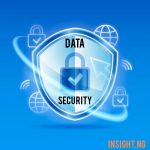In today’s digital era, data has taken on a quality almost equal to that of gold. It serves as the engine behind business strategies, customer engagement, and operational efficiencies.
However, with this great power comes an equally great responsibility. We must protect our data from the many threats that lurk within the vast expanse of the digital world.
As we rely more on algorithms and technology to store and manage our information, we must be cautious to guard against cyber attacks that endanger the security of our data.
By prioritizing data security and implementing robust protective measures, we can safeguard data and ensure that these measures are up-to-date in protecting against the ever-evolving methods of hackers, scammers, and con artists.
Table of Contents
What is Data Security?
Data security at its core is the practice of protecting digital information from unauthorized access, corruption, or theft throughout its entire life cycle. It covers everything, hardware, software, storage devices, user devices, access and administrative controls, and organization policies and procedures.
Accessing data in this digital world we live in is as easy as waking up and drinking water. Therefore, data security is an essential part of our digital and virtual lives. It’s very important to learn how to protect your data because data breaches attack personal information and private data then cease to be private.
Attackers may hack networks, systems, and accounts to steal your bank information, confidential data of an organization, credit card details, etc.
10 Effective Tips for Securing Your Data
-
Avoid phishing scams
Phishing scams occur when attackers deceive people into revealing sensitive information or installing malware such as ransomware. Phishing scams have evolved significantly through the years and might often mirror the site being targeted, allowing the attackers to observe the victim.
Moreover, phishing scams can be carried out by phone text or through social networking sites like Instagram, and Twitter, most commonly by E-mail. You can guard against this by being cautious when dealing with any official-looking E-mail, message, or phone call that asks for personal or financial information.
-
Practice good password management
Having a lot of passwords is inevitable in these times and it seems easy to take shortcuts like reusing the same password. A password manager makes it easier for you to maintain strong passwords for all your accounts.
It also reminds you to update your password and warns you if there’s a weak password that needs changing. LastPass, 1Password, KeePassword, and BitWarden are examples of very good password managers that give you your money’s worth.
Join our WhatsApp community to share your fresh ideas and connect with like-minded people. We’ll be glad to have you in our midst.
-
Set up two-factor or multi-factor authentication (MFA)
Typically, a user ID and password are sufficient for signing into your account. However, MFA enables you to add multiple layers to this standard protocol. This involves receiving a prompt to add another authentication method such as a code, fingerprint scan, or OTP sent via phone number or email alongside your password.
With this system in place, you’ll be required to enter more than two credentials while logging in. This ensures your account is more secure and makes it more difficult for hackers to access your data.
-
Use firewalls and anti-virus software
Hackers can get into your system and network through various methods, such as malware, viruses, phishing attacks, spyware, etc., to gain access to your data. With the help of anti-virus software and firewalls, your system will be capable of defending itself against these attacks.
You need to ensure that you keep your anti-virus software up-to-date and stop those cyber attacks right in its tracks.
You can use anti-virus software like Bitdefender Antivirus, McAfee, Norton, MalwareBytes Premium, G Data Antivirus, etc.
-
Avoid unfamiliar websites
When you come across new sites that might have been shared by family, friends or even strangers online, be cautious when visiting them. Some of them may contain drive-by download attacks that can affect your data security.
The attack doesn’t necessarily require you to click on any Ad on the site to be infected. It simply attacks the system by infecting malicious code as soon as you click on the website link.
-
Stay cautious on social media
In this modern age, it has become easier for us to reconnect and get in touch with our friends and family through various social media platforms like Facebook, Twitter, Instagram, etc.
However, you need to be careful with whatever you share with them online. Hackers can gain information from your social media pages and profiles.
-
Avoid useless downloads
Downloads are at the top of the list of tricks that cyber attackers and hackers use to gain access to your networks and system. A lot of Nigerians download movies, music, and software from sites that toe the dangerous line between legality and illegality.
We should all be careful when on these sites and avoid clicking on anything that may seem suspicious. Limit your downloads to save your data from any threats. You must avoid downloading unnecessary software. When installing anything, be careful of any pop-ups for Extensions or add-ons and decline them always.
-
Don’t use public Wi-Fi without a VPN
If you are using Wi-Fi in a public place make sure to use a VPN (Virtual Private Network) along with it. VPNs secure your data and encrypt the traffic between the server and your device. This increases the difficulty of hackers when they try to attack your device to access your data.
-
Use mobile devices safely
We rely a lot on gadgets for our day-to-day use. Frequent usage makes us susceptible to attacks on our data. To keep them protected, you should:
- Lock your device with a PIN or password.
- Only install apps from trusted sources (Apple AppStore, Google Play).
- Keep the device’s operating system up-to-date.
- Avoid transmitting or storing personal information on the device.
- Don’t click on random links or attachments from unsolicited and suspicious E-mails or texts.
Are you a bibliophile passionate about reading tech insights? Click here to join our list of newsletter subscribers and let’s keep you updated.
-
Lock your devices unattended in public
Always lock your mobile devices such as laptops, phones, or tablets when you need to leave them for a period to prevent someone else from gaining access to your devices. If you keep protected data in a flash drive or external hard drive, make sure they are encrypted and locked in a secure place.
Conclusion
The future of data security faces its own set of challenges. It’s also rife with many innovative strategies tailored toward countering these problems. Organizations and individuals must learn to adapt, be current with the latest information, and be proactive when dealing with data security.
In this ever-changing landscape, continual learning and adaptation are not just strategies, they are necessities. The challenge is clear and the path ahead is filled with challenges. Hence, we need to strike a careful balance between utilizing and exploring our data’s power and securing the data.
Related Posts
- Big Data Analytics for Nigerian Businesses: A Comprehensive Guide
- What is Data Science? All You Need to Know
- A Beginner’s Guide to Database Management System
Edited by Priscilla Ajayi.
About Author
- Obilom Adaeze is an undergraduate who has passion for writing. She loves listening to music and singing in her free time. Adaeze is a curious person who enjoys discovering new information and asking questions. She is a dedicated individual who will bring her unique perspective to any task.
Latest entries
 TechnologyOctober 6, 2023Navigating Data Security: Tips for Nigerians in a Data-Driven World
TechnologyOctober 6, 2023Navigating Data Security: Tips for Nigerians in a Data-Driven World Insight AfricaSeptember 3, 2023Global Impacts of Afrobeat Music on Different Industries’ Trends
Insight AfricaSeptember 3, 2023Global Impacts of Afrobeat Music on Different Industries’ Trends LifestyleJuly 3, 2023Top 15 Home Workout Routines Without Equipment
LifestyleJuly 3, 2023Top 15 Home Workout Routines Without Equipment

